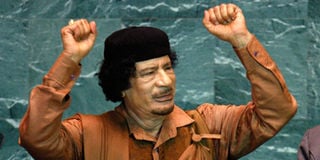Libyans remember revolution that ousted Gaddafi but brought chaos

Former Libyan leader Muammar Gaddafi.
Libyans marked 10 years Wednesday since the start of the uprising that toppled longtime ruler Muammar Gaddafi, ending a long dictatorship but throwing the country into a decade of violent lawlessness.
In western Libya, festive crowds gathered in public squares to watch anniversary fireworks, military parades and speeches.
"There is a wonderful atmosphere ... people are happy," said 22-year old Ziad Abdelhakim Arabi in the capital Tripoli, sporting sunglasses and slicked back hair.
"God willing, security will return to our dear country."
Abdul Hamid Dbeibah, the interim prime minister recently selected by Libyan representatives in a UN-brokered process, enjoyed a walkabout in the capital, surrounded by his bodyguards, AFP journalists said.
Drivers stuck in traffic jams blared loud music that was popular during the 2011 revolution and thousands thronged Martyrs' Square, once a favoured location for Gaddafi when delivering his rambling speeches.
But in the east, ruled by a rival authority bitterly opposed to the armed groups dominating the west, the mood was more sombre.
'We don't forget'
Residents of Zawiya, near Tripoli in the west, marched on the city centre where dozens of rebel fighters were executed in 2011 after being surrounded by Gaddafi's forces.
Flags hung from buildings still bearing the scars of mortar and small arms fire.
Those marks "will stay, so we don't forget what happened here," said Mofida Al-Romeih, who lost two brothers and a cousin in the massacre.
The commemorations came as the UN steps up efforts for a peaceful resolution to the bitter conflict that has divided the country since Gaddafi's ouster and killing in the NATO-backed uprising.
UN envoy Jan Kubis met Libyan leaders Tuesday on his first visit to the North African nation since taking up his post and stressed the importance of consolidating an October ceasefire.
The fragile truce has largely held in recent months.
But an apparent "targeted mortar attack" hit Sebha in southern Libya as people celebrated late Tuesday, killing a child and wounding 29, the UN mission in Libya said late Wednesday.
It strongly condemned the "heinous" attack and called for an investigation.
Kubis has called for a "smooth transition of power" following talks in Switzerland, which resulted in the formation earlier this month of a new interim executive authority tasked with leading the country to elections in December.
"The Libyan people have a genuine opportunity to finally achieve the revolution's goals of building a united, and truly sovereign state, free of foreign interference," Kubis said in a statement Wednesday.
UN chief Antonio Guterres, in phone calls with Libya's newly appointed leaders Tuesday, called for all foreign troops and mercenaries to leave, his spokesman said.
Turkey, Russia and the United Arab Emirates are all backing parties to Libya's conflict with manpower and arms, exacerbating the country's divisions in the wake of Gaddafi's demise.
Foreign fighters remain
While the streets of western Libyan cities were decked out with lights and banners, commemorations were low-key in the east, where an administration backed by military strongman Khalifa Haftar holds sway.
Even in the region's main city Benghazi -- where the revolution began 10 years ago --- no official events were planned, despite authorities declaring Wednesday a national holiday.
But people gathered in the streets of Benghazi on Wednesday, some carrying national flags. Others clutched photographs of loved ones lost in violence.
The defeat of Haftar's forces in June last year following a 14-month-long offensive against Tripoli led to the progress in UN-backed talks on a solution.
The strongman has officially thrown his weight behind the interim authority selected earlier this month, while the outgoing Tripoli based Government of National Accord (GNA) -- the target of Haftar's failed 2019-20 offensive -- has likewise backed the new power-sharing entity.
But much of Libya remains in the hands of a mosaic of neighbourhood militias born out of the rebel groups that toppled Gaddafi.
Some stand accused of war crimes that have gone unpunished, because of the militias' importance to the rival alliances in power in Tripoli and Benghazi.
"Justice has yet to be delivered to victims of war crimes and serious human rights violations," rights group Amnesty International said in a statement.
Many of the foreign forces whose intervention helped fuel the conflict of recent years also remain in Libya.
During the battle for Tripoli in 2019-2020, Haftar received military support from Russia, the UAE and Egypt, while the GNA received crucial backing from Turkey.
In December, there were around 20,000 foreign troops and mercenaries deployed inside Libya, according to the UN.
Asked if the UN had noticed any start of a withdrawal of foreign forces, spokesman Stephane Dujarric said the world body was not aware of any pullout.
"We want that to happen, obviously as soon as possible," he said.





